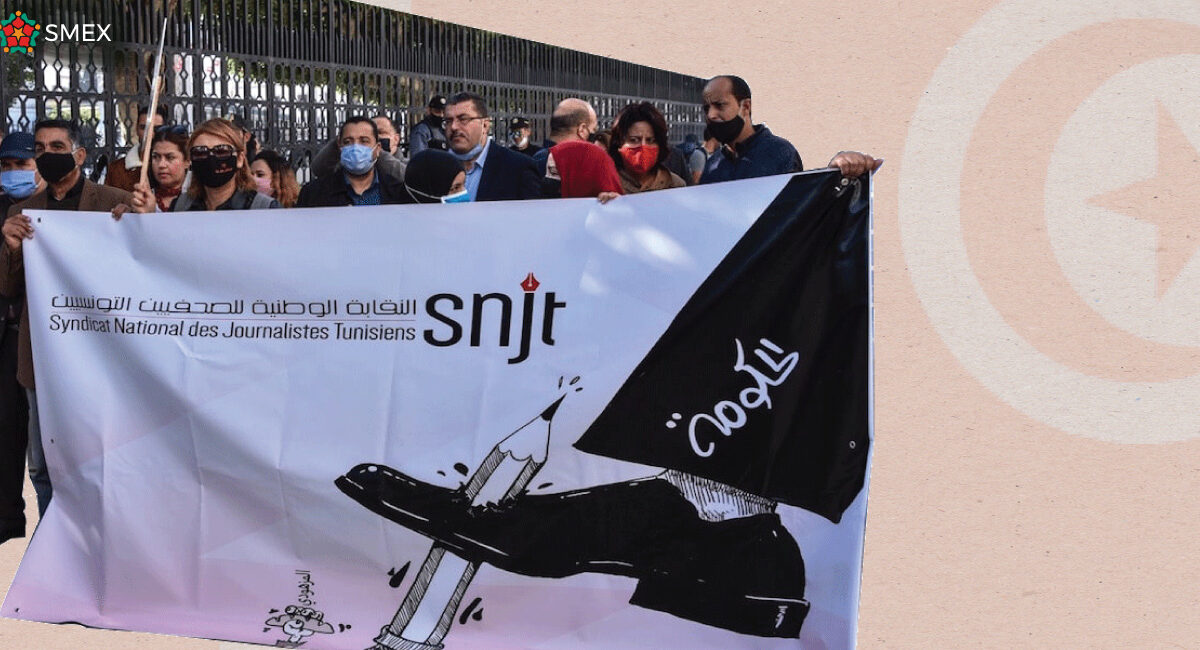“Some mindless people who are demanding freedom of expression are unaware that they already have it, but they’re living in an intellectual coma.”
This was part of the statement uttered by Tunisian President Kais Saied last Tuesday, in a Facebook video published by the official page of the Tunisian Presidency, denying the suppression of freedoms in the country.
Saied added that “those who seek to undermine Tunisia, whether inside or outside the country, and question the state of freedoms are either traitors or suffer from a deep intellectual coma from which they will never awake.”
On May 16, one day after Saied’s statement which coincided with World Press Freedom Day, the police summoned Cap FM journalist Amine Zoueibi for interrogation. The police summons did not identify the complainant or specify the charges pressed against Zoueibi, as the latter told SMEX.
However, Khawla Shabah, Coordinator of the Violations Against Journalists Monitoring Unit at the Tunisian Press Syndicate, stated on local radio station Diwan FM that the person who filed the complaint against Zoueibi was the Minister of Religious Affairs.
The complaint was due to a comment Zoueibi made on a post by journalist Mohammad Boughlab, who is being prosecuted by virtue of Decree No. 54 – the same decree used to summon Zoueibi. Tunisian website “Jinat” also reported that Zoueibi is facing the charge of “forming a gang” because of his comment in support of Boughlab.
A Hard Blow to the Press
Within two years, Tunisia’s ranking dropped significantly in the annual World Press Freedom Index, published on May 9 by Reporters Without Borders (RSF). According to the report, Tunisia is now ranked 121 out of 181 countries and is one of 38 countries where freedom of expression is deemed unsafe.
This decline is due to political and legislative factors, especially since the exceptional measures taken by Tunisian President Kais Saied on July 25, 2021. The National Syndicate of Tunisian Journalists released a report on May 3 confirming the impact of Saeid’s decisions on the decline of freedoms in 2022.
The report argued that “government policies and everyday practices are consistent with Saied’s vision, which is hostile to the press and seeks to obfuscate information.” The primary development during the past year was the series of trials based on Decree No. 54 against journalists, whose only crime was that they expressed their opinions. These trials targeted activists, lawyers, bloggers, and politicians who expressed their opinions on social media or through statements on media outlets.
Amira Mohammad, Vice-president of the National Syndicate of Tunisian Journalists, told SMEX that “Kais Saied has disregarded the Syndicate’s letters warning him of the dangers facing freedom of expression in Tunisia and has not met its demand of revoking Decree No. 54.”
“Tunisia’s ranking in the World Press Freedom Index and in the legal framework for freedom of expression has dropped, especially after the issuance of Decree No. 54.” In fact, Amira Mohammad believes that this decree “undermines the freedom of expression at all levels and leads to the oppression of journalists, activists, and politicians, as it allows lawsuits to be filed against them, such as those filed by the Minister of Justice, the Minister of Culture and the Minister of Religious Affairs.”
The annual report on freedoms published by the National Syndicate of Tunisian Journalists documented 17 cases against journalists. In four of these cases, the journalists in question were prosecuted under the Anti-terrorism Law, while another four were prosecuted under Decree No. 54 and one journalist was prosecuted under the Telecommunications Law. The lion’s share, however, was for the Criminal Code, as it was used as a basis for prosecution in nine cases.
Unfulfilled Promises
The Tunisian government may seem more lenient in its discourse towards certain organizations, but its practices indicate otherwise.
Samir Bouaziz, Advocacy Officer at RSF North Africa, told SMEX that he met with the Tunisian Minister of Interior last week to express RSF’s concerns about the laws used to prosecute journalists. “We reiterated our views on Decree No. 54 and stressed the need to revoke it, but the minister claimed that the decree was issued to organize processes rather than target journalists,” Bouaziz added.
Bouaziz explained to the minister that the decree “undermines the freedom of expression and the right to seek, receive and impart information, enshrined in Article 19 of the Universal Declaration of Human Rights.”
Bouaziz insisted that the government should repeal Decree 54, despite the minister’s claims that it doesn’t target journalists. “It negatively impacts all citizens and undermines their right to express their opinions, especially on digital platforms,” Bouaziz told SMEX.
Tunisian journalists face severe restrictions due to their work or their critical positions towards the government and President Kais Saied, which have been met either with trials or with incitement and defamation campaigns against them on social media.
According to the annual report of the National Syndicate of Tunisian Journalists, female journalists were the victims of incitement on 17 occasions, whereby their private information was shared on Facebook pages, based on findings by the Syndicate’s Violations against Journalists Monitoring Unit.
The Syndicate’s report concludes by saying: “Dozens of journalists, both men and women, have been victims of online harassment. They have been targeted for criticizing public policies and stirring debates around them. Journalists have also been the victim of illegal acts such as physical violence or the targeting of their children and family members due to statements they made or for influencing public opinion.”



